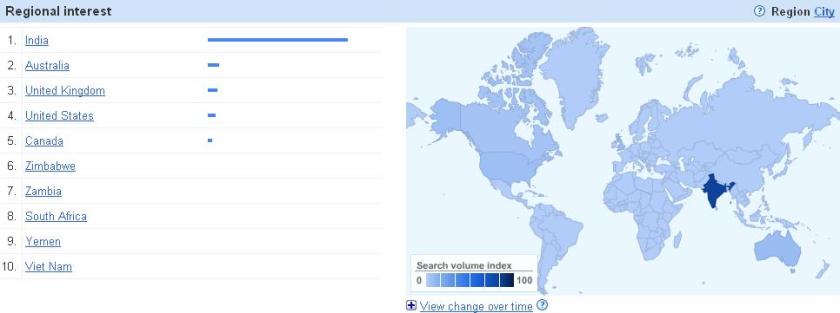I have been playing around with Google Insights for Search lately. It’s a nifty tool that allows you to compare search volume patterns across specific regions, categories, time frames and properties. The search results are presented in a textual manner, but there is also a map representation allowing you to drill down on regions and countries.
An explorer’s and system thinker’s walhalla! It didn’t take long before I found myself throwing some testing-related lingo at it:
I wonder what happens when “Software testing” is thrown into the mix?
Mmm… and what about “Agile testing”?
wOOt! “Testing conference”?
This can’t be. Let’s try ISTQB…
Same old, same old. Is this some kind of caching problem? Let’s park the testing stuff and throw in Alaska’s finest, “Sarah Palin”.
Okay, this actually makes sense. Let’s zoom in on the US. Drill baby, drill!
And sure enough, the top number of searches comes from the place she could see Russia from on a clear day.
Google Insights wasn’t messing with me. It’s real. The highest search volumes of almost all software testing-related terms seem to come out of India. Look who’s on a quest for knowledge.
Are Indian testers heavier google-users than the average Westerner? Is that because other sources of testing-related information are lacking? I’d love to hear the opinion of Indian testers on this.
Although this trend is remarkable, it’s not surprising. If the nature of many Indian testing blogs is something to go by, a lot of Indian testers *are* inquisitive and critical. It’s the birthplace of Weekend Testing, too. And the sapient tester virus is spreading rapidly: if you take a look at the blogs of Ajay Balamuragadas, Dhanasekar S, Parimala Shankaraiah, Pradeep Soundararajan, Shrini Kulkarni, Manoj Nair, Debasis Pradhan, Santhosh Tuppad, Sharath Byregowda, Mohit Verma, Jaswinder Kaur Nagi, Santosh Shukla, Nandagopal and Madhukar Jain, their enthousiasm and sheer passion for the craft are contagious.
I like the way many of them are taking skill development into their own hands. Bhārat, the home of continuous learning and improvement!
I wonder how long it would take to put Belgium on that Google Insights testing map. I’m afraid this won’t be happening anytime soon – but I’m pretty confident that we will get the term “governmental crisis” up there in a heartbeat.







Dear Zeger (I hope it’s ok to call you like that),
First of all, Thanks for including me on the list 🙂
Regarding the topic – I think Indian Testers do search a lot for testing related stuff and blogs these days. Newbees are now actually trying to learn the craft rather than mugging up some theories. Fair share of credit should be given to Pradeep Soundararajan – with his insightful blog, he has transformed some novices to become more passionate about testing.
I’m a new reader to your blog – started reading this when I found it in the top 100 software testing blogs. 🙂
Hello Nandagopal,
Welcome to my blog, and of course it is ok to call me Zeger (after all, that’s my name) :-). Thanks for taking the time to react. I already suspected that Pradeep might be (in)directly responsible for the sapient tester boom. Kudos to him -and to the students of the craft too!
Well Zeger, I am no expert on the browsing habits of Indian testers. But, I think that the trend that you describe is not just because Indian testers are more inquisitive than western testers.
My observations of the browsing habits of Indians indicate:
1. Yes, they use Google heavily. Using Google is really a kind of reaction when in need of any information. Because it is more convenient, Google is used even before the user searches for information locally.
2. Unlike western users, Indian internet users search terms on Google and then browse a number of results quickly (without reading each page at length).
3. They are more likely not to bookmark a favorite page but rather search it again.
Due to these reasons, you may find India topping the list even for other software terms e.g. “software” and “dot net”.
As a side note, you may be interested to know that I write on software testing on my blog, Software Testing Space.
Hello Inder! Thank you for clarifying the Indian browsing habits – interesting fact about “bookmarking” vs “searching again”! I’ll check out your blog too, thanks!
Thank you Zeger for pointing out Google Insights for Search. I will look forward to your visit to STS and your comments on the same. Thanks again.
Wow Nice Post Zeger, I wonder how many of us could have thought about this & Thanks a lot for mentioning me I am honoured.
Cheers,
Jassi
@Inder Don’t consider us Indians to be so dumb, the first thing we do is bookmark our favorite page.
@Jassi,
Your retort deserves a reply.
Not saving a favorite is a matter of choice, not being dumb at all. Many internet users in India use public computers (e.g. in cyber cafes). It would not make sense to save a favorite on a computer without knowing whether one would use the same computer next time or not.
Even with my own computer, I tend not to save favorites. I used to do this earlier. However, I ended up having too many favorites without really the time to visit them again.
@Zeger,
I perhaps missed to mention that the reason could also be attributed to the sheer large numbers of testers in India.
I had used Google trends in 2007 to share my point of view on my local testing community (http://mubbashir11.blogspot.com/2007/08/testing-market-in-pakistan.html).
Its good to see that Pakistan still ranks 2.
@Inder “Software Testing” is not such a specific search term which might land you to your Favorite page. I think there are more people in India (and in Pakistan) who are interred in “Software Testing”, I mean this term would be a preferred choice of some one who is just got into it then some one who know a thing or two about software testing.